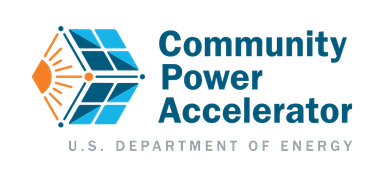Community Power Accelerator: How it Works
We help promising solar projects find capital providers ready to support affordable and resilient energy for communities.
Who Can Join?
The Community Power Accelerator brings together the essential partners in solar development:
Solar Developers
We provide the tools and connections developers need to launch successful solar projects. Our platform helps your projects access capital, complete pre-development planning, and integrate meaningful benefits into communities. Peer-to-peer connections with other solar developers provide opportunities to collaborate.
Capital Providers
Capital providers such as lenders, investors, and philanthropies can connect with verified solar projects that align with their mission. Our platform helps you identify pre-screened opportunities that align with both your financial requirements and impact goals. Peer-to-peer connections with other capital providers enables them to find others who can co-fund projects.
Each member of our platform undergoes a thorough verification process, ensuring high-quality partnerships and projects. Our advanced algorithms help you find partners whose goals, location, scale, and priorities match yours.
How it Works
A simple process to turn your solar vision into reality
Developers
Capital Providers
Step 1: Create Your Organization Profile
Step 1: Create Your Organization Profile
Step 2: Submit Your Organization Profile
Step 2: Submit Your Organization Profile
Step 3: Discover Capital Providers or Find Other Developers for Collaboration
Step 3: Discover Solar Developers or Other Capital Providers to Increase Your Impact
Step 4: Request Contact
Step 4: Request Contact
Connect
Unlock Resources for Solar Projects
The Community Power Accelerator offers comprehensive tools and support to help developers, including community-based organizations, and capital providers drive successful solar projects. Our resources are designed to guide you through every stage of solar development.
Credit-Ready Checklist
This essential planning tool was developed in collaboration with over 40 financial institutions, including commercial banks, investors, CDFIs, and experienced solar developers.
All users get access to this Credit-Ready Checklist , which helps guide developers through critical development milestones to ensure they are working toward robust, shovel-ready projects to attract more capital providers. Capital providers can also use the Credit-Ready Checklist to ensure they are asking relevant questions when conducting due diligence.
Technical Assistance Program
Through the National Community Solar Partnership+ (NCSP+), you'll have access to free one-on-one support. Our technical experts help address financial, technical, and policy challenges that may arise when developing or assessing projects.
You must be a National Community Solar Partnership+ partner to access this valuable resource. While this program provides comprehensive project support, please note it does not include financial assistance, accounting or tax advice, advocacy, or marketing support.
Learn more about technical assistance and apply to join the NCSP+ community.
Community Solar Development Training Series
Take advantage of educational opportunities offered free through the Accelerator and University of New Hampshire Carsey School of Impact Finance.
Learn more about the solar development trainings offered through the Training Series.
Learn more about the solar financing trainings offered.
